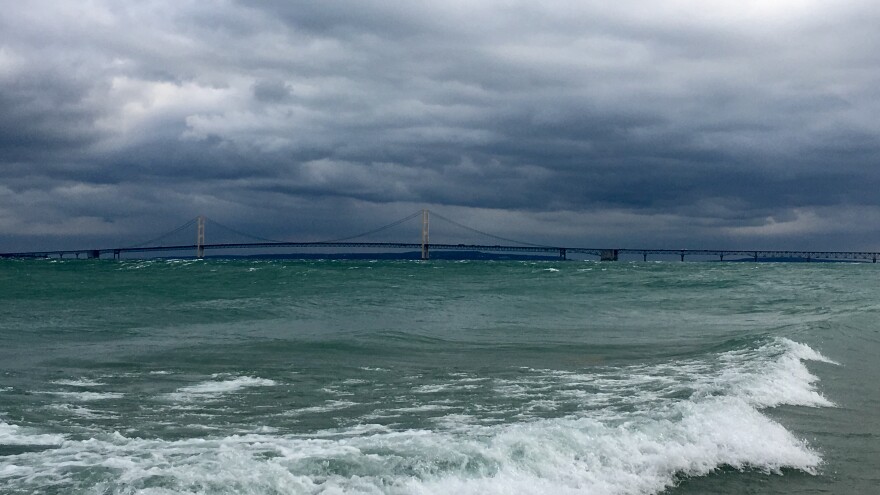Leaders from 51 tribal nations, including some in Michigan, blasted Canada’s support of Enbridge’s Line 5 pipeline last week.
In a report sent to the United Nations Human Rights Council, the group demanded tribes from around the Great Lakes have a say in the matter.
The report comes months before Canada will have its human rights record scrutinized by the U.N. in a routine event known as the Universal Periodic Review (UPR).
Line 5 transports crude oil and natural gas liquids across the U.S.-Canada border and under the environmentally and culturally significant Straits of Mackinac.
“The rights of Indigenous people, of my people, are rights that should be respected by all sovereigns both domestic and abroad,” said President Whitney Gravelle of the Bay Mills Indian Community, in a statement. “Canada’s support of Line 5 is a disaster in the making for the entire Great Lakes region because an oil spill will poison our fish, harm our sacred sites, contaminate our drinking water – and ultimately destroy our Indigenous way of life.”
In 2021, Canada invoked the 1977 Transit Pipeline Treaty with the U.S. for the first time which sets forth agreements related to the transit of oil across the border.
It's not the first time the Canadian government has attempted to stall legal proceedings. Michigan and Enbridge are waiting for a federal judge to decide if Gov. Gretchen Whitmer’s Line 5 shutdown order will stand in a state or federal court.
Meanwhile, Tribal Nations called on Canada to withdraw its invocation of the Pipeline Treaty among other demands. They include the following text:
- Ensure that affected Indigenous Nations, who are sovereigns and human rights holders, are invited to participate in discussions regarding Line 5’s future, including any negotiations under the PipelineTreaty, so long as they continue.
- Interpret all international treaties, including the Pipeline Treaty, consistently with Canada’s human rights obligations.
- Ensureaffected Indigenous Peoples’ Free, Prior, Informed Consent (FPIC) before providing support for extractive sector projects and withdraw support from projects that do not have affected Indigenous Peoples’ FPIC.
- Ensure that corporations under Canadian jurisdiction do not cause or contribute to foreseeable threats to human rights.
Read the full report from the coalition of tribal governments here.
David Arroyo, Chairman of the Grand Traverse Band of Ottawa and Chippewa Indians told IPR News that he continues to worry about the environmental damage the 70-year-old pipeline could cause to the Straits of Mackinac.
“It's just a matter of time before there's an accident. – a catastrophic accident that's going to change our livelihood for the whole state,” Arroyo said. “That's one thing I wish people would understand, that it's not just an indigenous problem, it's all of our problems.”
Enbridge said Line 5 continues to operate safely and that relationships with Indigenous communities is, "essential to Enbridge's continued success."
“We appreciate that leaders of both federal governments are engaged in the treaty resolution process,” Enbridge spokesperson Ryan Duffy wrote in a statement. “Discussions are ongoing and we’re hopeful they will find a way forward for this critical infrastructure.”
Most recently, the decision to build a tunnel underneath the Straits of Mackinac to shield Line 5 from damage was delayed to 2025 by the U.S. Army Corps of Engineers.
The project has been met with protests for years, and Gov. Gretchen Whitmer’s administration continues fighting in court to shut down Line 5 entirely.
The U.N. will be conducting its UPR of Canada for the fourth time in November.

